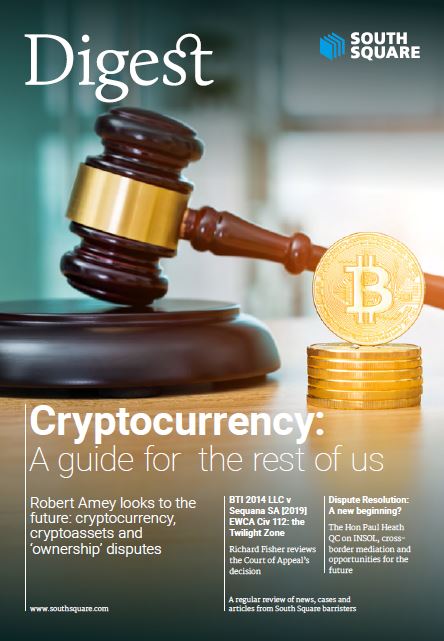

Articles about Bitcoin and other cryptocurrencies tend to fall at one end or other of a spectrum. At one extreme are the articles so heavy with the technical jargon of ‘consensus algorithms’, ‘blockchain’ and ‘unspent transaction output’, that anyone lacking a PhD in computer science will struggle to understand them. At the other extreme are the descriptions given in the mainstream press, which talk in loose language about ‘electronic money’ and ‘digital currency’ without attempting to explain what these concepts actually involve.
This creates obvious difficulties for the lawyer who wants to know what legal rights and obligations attach to a bitcoin,1 or for the liquidator who wants to know what to do with cryptocurrency that falls within the estate. The problem is compounded by the fact that the whole concept of cryptocurrency is in its infancy compared to other types of asset which lawyers and IPs typically come across. The first bitcoin transaction, for example, occurred just over 10 years ago. A further source of confusion is the fact that different cryptocurrencies might rely on wildly different underlying technology,such that the analysis applicable to one will not necessarily be applicable to the other. This article focusses on Bitcoin, the best-known cryptocurrency, but the analysis in relation to other cryptocurrencies may well be very different.
What is a bitcoin?
It is impossible to discuss the legal incidents of Bitcoin without some explanation of what it actually is. It is perhaps easiest to explain what a bitcoin is by describing (avoiding jargon without, as far as possible, sacrificing technical accuracy) how they are held and transferred. To receive a bitcoin, one must first create a ‘wallet’.2 This is easily done by appropriate software, which will generate two ‘keys’, which are simply strings of letters and numbers. One of these keys is intended to be public, and is a sort of ‘address’ to which others can send bitcoins. The other should be kept private, and is the secret key which the wallet ‘owner’ uses to transfer bitcoins out of the wallet and into the wallets of others.
The language of wallets, however, is apt to mislead. Nothing is actually stored in the ‘wallet’. The ‘wallet’ simply consists of the two ‘keys’. These keys can be stored on a computer, or they can be printed on a physical piece of paper.3 The ‘keys’ enable users to add entries to a ledger, which records the transfer of bitcoins. This ledger is not stored in any central location. Instead, multiple copies are distributed across the network (making unauthorised interference practically impossible), and a new entry can only be made by using the private key of the most recent recipient, the bitcoin ‘owner’, and the public key of the new ‘owner’.
If the ‘owner’ of a wallet loses the keys, for example if he loses the computer hard drive or piece of paper on which the keys are stored, then he loses the ability to add an entry to the ledger, making it impossible for him to transfer his bitcoins. A headline in the Guardian newspaper in 2013 referred to a bitcoin owner who had accidentally thrown away a “hard drive containing bitcoins worth £4m”.4 This is not entirely accurate. The hard drive did not actually contain bitcoins, rather, it contained the keys which would enable the ‘owner’ to make a new entry on the ledger, and sell his bitcoins to others.
What does the ‘owner’ of a bitcoin actually ‘own’?
If a person owns a physical banknote for, say, £10, she has a property right which the courts will enforce. A thief who steals that banknote will be liable both to a criminal sanction and to civil action at the suit of the victim. If the owner of the banknote stores her banknote in a safe deposit box at the local bank, and the bank subsequently enters an insolvency process, the owner of the banknote is nonetheless entitled to get her banknote back.
If, on the other hand, a person deposits a £10 banknote into a cash account at a bank, then he typically acquires a chose in action against the bank – a legally enforceable debt payable by the bank to the depositor. Unlike the person who has a physical banknote in her hand, or the person who has stored her physical banknote in a safe deposit box which she alone controls, the bank accountholder does not have a property right. If the bank becomes insolvent, the accountholder has no right to enter the bank and take back the £10 note he previously handed over. He nonetheless has a claim against the bank which the law will recognise.
So what does the owner of a bitcoin have? As noted above, bitcoins are transferred by making entries on a ledger. In the modern world, all sorts of valuable assets are traded simply by making entries on electronic ledgers. To take a simple example, a person who wishes to invest in gold might choose to invest through an account at a brokerage. The physical gold itself might be held in storage somewhere many miles away, and the investor might never see it. Instead, the investor’s holding will simply be recorded on a ledger held by the broker. If the investor wishes to sell her gold to another, she will instruct the broker to make the necessary entries in the ledger. The physical gold stays exactly where it is. If the investor is asked exactly what it is that she is buying and selling, she will respond that she has the right to demand a delivery of physical gold from her broker, and this right has value, even though she might have no intention of ever exercising it.
The owner of a bitcoin, however, does not have the right to demand anything from anyone. He has the ability (through knowledge of the relevant ‘key’) to make an entry on the ledger. But unlike the depositor at the bank, who has the right to demand cash from the bank, or the investor with the gold brokerage, who has the right to demand delivery of gold, the owner of a bitcoin does not have any right at all.
EU Carbon Emissions Allowances
Within the European Union, operators of carbon dioxide-emitting installations above a certain size are given an annual credit of EU Allowances (EUAs), with each EUA permitting the emission of one metric tonne of carbon dioxide. Operators who have adopted greener technology can sell their EUAs at a profit to other operators, who have insufficient EUAs for their activities. The idea is to provide an economic incentive for the introduction of green technology.
EUAs do not exist in physical form, and exist solely as an entry on a register. In Armstrong GmbH v Winnington Networks Ltd [2013] Ch 156, the claimant’s EUAs had been ‘stolen’, and ultimately sold through the defendant EUA trader to an innocent third-party purchaser. The High Court held that the defendant was liable in knowing receipt.
To some legally trained bitcoin enthusiasts, the decision is evidence of English law’s willingness to protect novel forms of intangible property. At paragraphs 60-61 of his judgment, the deputy judge remarked that an EUA was not a chose in action (because it did not confer on its ‘owner’ any right which a court would enforce), but nonetheless held that it should be recognised as “intangible property”. If intangible property, which exists only in the form of an entry on an electronic ledger, is capable of protection, then so too (some argue) is Bitcoin.
The reality is less clear. The decision in Armstrong relies on novel and unorthodox reasoning which is difficult to reconcile with the established authorities on constructive trusts and knowing receipt. It remains to be seen whether this first instance decision will be followed in other cases. But even if the result is correct in the context of misappropriated EUAs, to apply the same reasoning to misappropriated bitcoins would be a considerable leap.
Although both EUAs and bitcoins both exist only in virtual form, the similarities end there. An EUA has legal consequences in the real world, in that it permits an operator to do something which would otherwise be unlawful. This is what the court in Armstrong recognised as intangible property. There is nothing particularly novel about this part of the analysis. English law has long recognised that a licence to do something which would otherwise be prohibited might not fall within the traditional definition of a chose in action, but is nonetheless a form of intangible property, see for example the analysis of export licences in Attorney-General of Hong Kong v Daniel Chan Nai-Keung [1987] 1 W.L.R. 1339.
The owner of a bitcoin has no ‘realworld’ legal rights – he simply has a key which enables him to modify the ledger. The decision in Armstrong to recognise EUAs as intangible property therefore does not necessarily mean that the same analysis will apply to Bitcoin.
Knowledge and confidential information
In Oxford v Moss (1978) 68 Cr.App.R. 183, a crafty university student pinched an advance copy of an exam paper, copied it, and then replaced the original. Having replaced the original, he could not be charged with theft of the physical paper. But the Theft Act, as then in force, also prohibited the misappropriation of “intangible property”. The student was prosecuted for theft on the basis that he had stolen the university’s confidential information. The prosecution failed: confidential information is not intangible property.
The civil law takes an even more restrictive view of property than the criminal law. While the criminal law recognises that intangible property(albeit not information) can be stolen, the civil law tort of conversion only applies to physical property: OBG v Allan [2008] AC 1.
Nowadays, the misappropriation of bitcoins would likely be caught by the offences created by the Computer Misuse Act 1990 and the Fraud Act 2006. But what consequences does the civil law provide for the misuse of confidential information, such as a private key? Rather than seeking to extend the law concerning property rights to bitcoins, a more fruitful exercise would be to apply by extension the existing law concerning breach of confidence.
In 1987, a disaffected MI5 intelligence officer, Peter Wright, published an autobiography entitled ‘Spycatcher: The Candid Autobiography of a Senior Intelligence Officer’. Unsurprisingly, the British Government sought to block its release in the UK. The attempt ultimately failed because, by the time the case reached the House of Lords, the book had been published overseas and was readily available to anyone who wanted to read it. However, the judgments in Attorney General v Observer Ltd [1990] 1 A.C. 109 make clear that a person who comes into possession of confidential information, however inadvertently, is under an obligation not to misuse it. An injunction will be available to restrain misuse, and the recipient may be liable to account for any profit he makes as a result of the misuse. There is no obvious reason why these principles should not apply to a person who obtains the private key to another’s Bitcoin ‘wallet’.
Insolvency
The ‘owner’ of bitcoins has, in the eyes of the law, no more than a right to prevent others misusing his private key. What happens to this right when the owner becomes bankrupt?
It has been held that a bankrupt’s personal correspondence does not form part of the estate,5 and nor does a right to legal professional privilege.6On this footing, a private Bitcoin key should not fall within the estate.
On the other hand, it has been said that the word ‘property’ used in the Insolvency Act:
“is not a term of art but takes its meaning from its context … that in bankruptcy the entire property of the bankrupt, of whatever kind or nature it may be, whether alienable or inalienable, subject to be taken in execution, legal or equitable, or not so subject, shall, with the exception of some compassionate allowances for his maintenance, be appropriated and made available for the payment of his creditors … It is apparent from the terms of section 436 of the Insolvency Act 1986 that the definition is to some extent circular but is not exhaustive. Further … it is hard to think of a wider definition of ‘property’.”7
On this analysis, the fact that Bitcoin does not fit easily into our existing definitions of ‘property’ should not matter. It is obviously consistent with the scheme of the insolvency legislation that an insolvency officeholder should be able to realise bitcoins in the insolvent estate, regardless of whether they can be brought within some previously recognised category of ‘property’.
It appears that the criminal courts are already taking this pragmatic approach. In R v Teresko [2018] Crim LR 81, a drug dealer’s house had been searched, revealing a piece of paper containing a private Bitcoin key. The Crown applied under the Proceeds of Crime Act 2002 s.47 (which applies to ‘realisable property’) for an order permitting the police to convert the bitcoins (around £975,000 worth) into sterling. The order was granted.
Conclusion
A debate rages between Bitcoin enthusiasts, who are convinced that cryptocurrencies will revolutionise the international economy, and sceptics, who are convinced that the whole thing is a massive bubble, if not a downright scam.
Regardless of who is right, cases involving the tax treatment of Bitcoin trading8 and the regulatory implications9 have already made their way before the court. It is surely only a matter of time before disputes concerning the ‘ownership’ of cryptoassets, and the impact of insolvency, come before the courts.
1 Bitcoin is usually capitalised when referring to the technology generally, while the individual unit is not capitalised.
2 This assumes that the bitcoin is being held directly. Many investors do not have a wallet of their own, and instead invest indirectly through bitcoins held in the wallet of a bitcoin exchange.
3 Although this may sound old-fashioned, it is reportedly the method used by the Winklevoss twins to avoid their bitcoins falling into the hands of hackers: https://www.independent.co.uk/lifestyle/gadgets-and-tech/news/bitcoin-camerontyler- winklevosscryptocurrency-sharedinvestment-keycut-a8120301.html
4 https://www.theguardian.com/technology/2013/nov/27/hard-drivebitcoinlandfill-site. There are numerous similar stories of early Bitcoin users
losing bitcoins which, at today’s prices, would be worth an eyewatering sum.
5 Haig v Aitken [2001]Ch. 110.
6 Shlosberg v Avonwick Holdings Ltd [2017] Ch. 210
7 In re Celtic Extraction Ltd [2001] Ch 475, 486
8 Skatteverket v Hedqvist(C-264/14) [2016] S.T.C. 372
9 See, for example, United States v Murgio No.15-CR-769 (AJN) (SDNY April 21, 2016), Securities Exchange Commission v Shavers 4:13-CV-416, United States District
Court, Eastern District of Texas, Sherman Division (6 August 2013), United States v Ulbricht No. 15-1815, US Court of Appeals for the Second Circuit (31 May 2017).







![Brake & Anor v The Chedington Court Estate Ltd [2023] UKSC 29](https://southsquare.com/wp-content/uploads/2024/02/Brake-Anor-scaled-e1728649908896.jpeg)






![New Judgment: CM Telecom (UK) Ltd v Buck [2026] EWHC 161 (Comm)](https://southsquare.com/wp-content/uploads/2025/06/tingey-injury-law-firm-DZpc4UY8ZtY-unsplash-scaled-e1750759105761.jpg)
